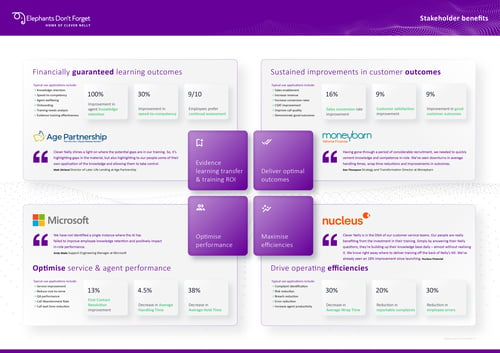AI-powered contact centres: why the human element is more important than ever
Contact centres are improving agent experience with a humanised approach to learning and development, enabling future-oriented leaders to ensure their agents stay ahead of the competency curve.
AI-powered contact centres: why the human element is more important than ever
Contact centres are improving agent experience with a humanised approach to learning and development, enabling future-oriented leaders to ensure their agents stay ahead of the competency curve.
AI triggers 'paradoxical' shift
The rise of Artificial Intelligence (AI) in the contact centre industry has sparked a ‘paradoxical shift’, according to a recent report published in Contact Centres.com. While AI is automating routine tasks and reducing labour costs, it's also driving the need for a more skilled and adaptable workforce. In this new paradigm, AI empowers agents to focus on higher-level tasks, enhancing customer experience and driving business growth.
Despite the automation potential of AI, a significant number of contact centre managers (70%) anticipate an increase in the number of agents over the next decade. This is because AI is not replacing agents entirely; rather, it's transforming their roles.
Traditionally, contact centres have relied on agents to handle a wide range of tasks, from answering routine questions to resolving complex customer issues. AI is now automating many of these routine tasks, freeing up agents to focus on more sophisticated interactions that require critical thinking, empathy, and problem-solving skills.
Evolving the role of agents: champions of customer experience
‘AI is not displacing contact centre agents; it's elevating their roles.’ That’s the key message championed by our customers and over three quarters of contact centre managers surveyed in the report. As AI handles administrative tasks and standardises routine interactions, contact centres are now looking at how employee-centric technology can elevate their agents to become true brand guardians, wielding the power to influence corporate perception, enhance customer loyalty, and drive profits.
In this new era, agents are not just customer service representatives; they are brand ambassadors, experts, and problem solvers. They are the face of the company, building relationships with customers and ensuring that every interaction leaves a positive impression.
Find out how our technology is supporting contact centre leaders to improve agent performance and customer experience...

"Clever Nelly’s greatest quantifiable impact has been increasing knowledge and the subsequent effects as a result. The NPS scores for the client and contact centre are increasing, fewer complaints are being sent back, we’re definitely noticing significant changes. Nelly is helping our people to remember their training, so they are doing everything in the right way. That’s huge for us, as it means there are fewer issues to address. Another benefit has been agent empowerment. You can hear that they’re more confident on calls in what they are saying, rather than putting someone on hold or getting a colleague to call them back."
Danielle Sheppard, Service improvement Manager at Echo Managed Services
![]()
"Clever Nelly supports our people to improve their knowledge and confidence, and ultimately deliver a better customer experience. Colleagues have really embraced the tool and, by focusing solely on engagement, we are seeing all of the benefits play out naturally. When our associates see a question come round again that they previously couldn’t answer, they’re remembering it. It validates the whole theory behind embedding learning and it’s great, because it’s self-development done without any over or micro-management."
Nina Tidd, Head of Contact Centre at NewDay
"Clever Nelly is really user-friendly. It simply pings questions to our people and it’s simple to answer and review scores. It means we know right away where to deliver training off the back of Nelly’s MI. We’ve already seen an 18% improvement since launching in October. Clever Nelly helps us recognise how knowledgeable our frontline people are. It’s a real vote of confidence."
Suzi Norris, Head of Contact and Service Delivery at Nucleus
Bridging the competency gap: 7 strategies for success in 2024
We're supporting contact centres to bridge the competency gap and cultivate a team of future-ready agents. Click below to access our infographic outlining some of the benefits that your industry peers are seeing from deploying our AI.
Invest in comprehensive training and development
Provide targeted training programs that focus on critical thinking, problem-solving, adaptability, emotional intelligence, and effective communication. Develop training modules that are tailored to different agent roles and experience levels.
Measure and refine training effectiveness
Continuously evaluate the effectiveness of training programs and adjust as needed to maximise their impact. Track agent performance metrics before and after training to assess the impact of training interventions.
Prioritise employee engagement
Engaged agents are more productive, loyal, and less likely to leave. Invest in employee well-being and recognition programs to foster a thriving work environment. Conduct regular assessments to gather feedback and identify areas for improvement and / or operational risk.
Listen to agent feedback
Actively seek and incorporate agent feedback to identify areas for improvement and tailor training programs accordingly. Hold regular meetings with agents to discuss their challenges and suggestions. Establish a culture of open communication and continuous improvement.
Equip agents with support mechanisms
Provide training on stress management and conflict resolution techniques. Ensure that you can quantify specific high-risk competencies at a sufficiently granular and individual level, including: processes, policies, product/service and – where applicable – regulatory compliance.
Foster a culture of recognition and rewards
Recognise and reward agents for their contributions to enhance engagement and retention. Implement a system of rewards and incentives that aligns with strategic goals. Celebrate successes and milestones to boost morale and motivation.
Leverage AI for agent empowerment:
Utilise AI tools to streamline administrative tasks, provide self-service scheduling options, and enhance agent productivity. AI can help agents access/recall information quickly, automate repetitive tasks, and personalise customer interactions – ensuring you can deliver a better customer experience.

